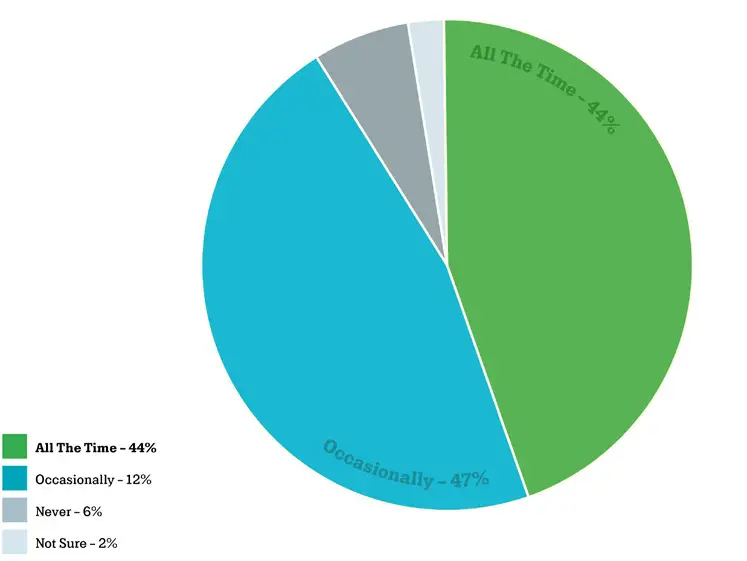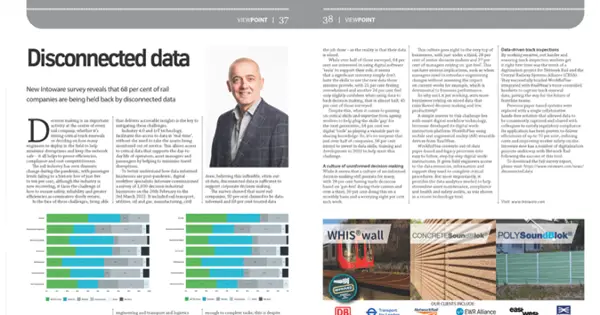Decision making is an important activity at the centre of every rail company. Whether it’s timing critical track renewals or deciding on how many engineers to deploy in the field to help minimise disruptions and keep the network safe. It all helps to power efficiencies, compliance and cost competitiveness.
The rail industry saw dramatic change during the pandemic. With passenger levels falling to a historic low of just five to ten per cent. Although the industry is now recovering, it faces the challenge of how to ensure safety, reliability and greater efficiencies as commuters slowly return despite dealing with disconnected data.
In the face of these challenges, being able to respond quickly and accurately is critical not only to competitiveness, but survival. Having an effective digital strategy in place that delivers actionable insights is the key to mitigating these challenges caused by disconnected data.
The importance of Industry 4.0
Industry 4.0 and IoT technology, facilitates the access to data in ‘real-time’. Without the need to take the assets being monitored out of service. This allows access to critical data that supports the day-to-day life of operators, asset managers and passengers by helping to minimise travel disruptions due to disconnected data.
To better understand how data informed businesses are post-pandemic, Intoware commissioned a survey of 1,030 decision makers. (28th February to the 3rd March 2022). It included rail transport, utilities, oil and gas, manufacturing, civil engineering and transport and logistics sectors. Everyone from senior decisions makers, managers, supervisors to frontline workers were asked key questions to discover how they use data?
Questions were aiming around helping businesses to become data-informed. So they can make the most of their data insights. And included:
- do you see data as an asset?
- what the current challenges are to accessing data?
- how confident you are using digital ‘tools’?
- whether your work culture is driven by data or intuition?
- Do you plans to invest in data-skills?
Survey findings
Intoware found that 68 per cent of rail companies post-pandemic, are relying on legacy systems and spreadsheets to get tasks done. Believing this inflexible, often out-of-date, disconnected data is sufficient to support corporate decision making.
The survey showed that most rail companies, 92 per cent claimed to be data-informed. While 68 per cent trusted data enough to complete tasks. This is despite most of them relying still on disparate legacy systems.
Intoware’s CEO, Keith Tilley, comments: ‘The research revealed that most of those surveyed believe they are data-driven, when in reality they could be relying on old, out-of-date data. This disconnected data acts like a ball and chain, tying down your staff as they spend a huge amount of time trying to unlock data trapped in spreadsheets and legacy systems to meet the demands of businesses, customers and regulators.’
With 68 per cent of decision makers having access to data and over three quarters. 76 per cent, believe that data is an asset, which is very good news. However, just under half of those surveyed, 47 per cent use data only occasionally to help get the job done. The reality is that their data is siloed, creating disconnected data.

While over half of those surveyed, 64 per cent are interested in using digital software ‘tools’ to support their role. It seems that a significant minority simply don’t have the skills to use the new data these systems provide. With 21 per cent feeling overwhelmed and another 24 per cent feel only slightly confident when using data to back decision making. That is almost half, 45 per cent of those surveyed.
Solving the skills gap crisis
Despite this, when asked about passing on critical skills and expertise from ageing workers to help plug the skills ‘gap’ for the next generation. 64 per cent see digital ‘tools’ as playing a valuable part in sharing knowledge. So, it’s no surprise that just over half of companies, 56 per cent intend to invest in data skills, training and development in 2022 to help meet this challenge.
A culture of uninformed decision-making
While it seems that a culture of un-informed decision making still persists for many. 28 per cent having made decisions based on ‘gut-feel’ during their careers. While over a third, 36 per cent doing this on a monthly basis and a worrying eight per cent each week.

This culture goes right to the very top of businesses. With 28 per cent of senior decision makers and 27 per cent of managers relying on ‘gut-feel’. This can have serious implications. For example when managers introduce engineering changes without assessing the impact on current works it can be detrimental to business performance.
So why isn’t it yet working? With most businesses relying on siloed data that risks flawed decision making and low productivity?
A simple answer to this challenge lies with smart digital workflow technology. Intoware developed its digital work-instruction platform WorkfloPlus using mobile and augmented reality (AR) wearable devices from RealWear.
WorkfloPlus converts out-of-date paper-based and legacy processes into easy to follow, step-by-step digital work-instructions. It gives field engineers access to the data resources, information and support they need to complete critical procedures. But most importantly, it provides the data analytics needed to help streamline asset maintenance, compliance and health and safety audits, as was shown in a recent technology trial to fix disconnected data issues.
Data-driven track inspections
By working smarter, not harder and ensuring track inspection workers get it right first time was the remit of a digitisation project for Network Rail and the Central Railway Systems Alliance (CRSA). They successfully trialled WorkfloPlus integrated with RealWear’s voice-controlled headsets to capture track renewal data, paving the way for the future of frontline teams.
Previous paper-based systems were replaced with a single collaborative hands-free solution that allowed data to be consistently captured and shared with colleagues to satisfy regulatory compliance. Its application has been proven to deliver efficiencies of up to 70 per cent, reducing costs and improving worker safety on site. Intoware now has a number of digitalisation projects underway with Network Rail following the success of this trial.
Download the full Why is disconnected data holding you back? whitepaper to find out more.

